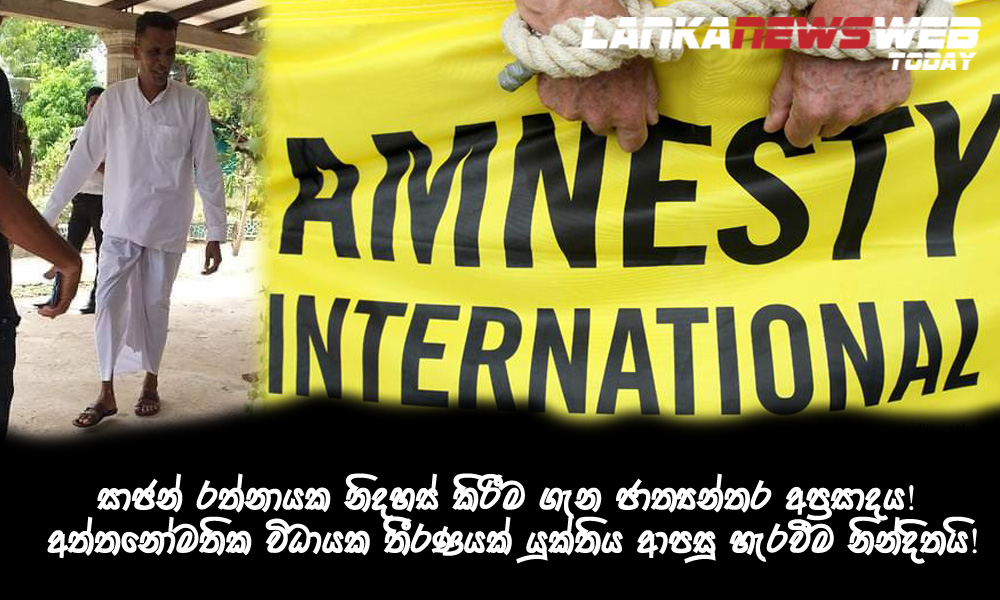Published on: Mar 26, 2020 – “Where accountability is so rare for serious human rights violations in Sri Lanka, the government’s arbitrary decision to release Sergeant Rathnayaka sends an extremely worrying message.”
ශ්රී ලංකාවේ බරපතල මානව හිමිකම් උල්ලංඝනයයන් සම්බන්ධයෙන් වගවීම ඉතා දුර්ලභ වන අතර, මිරුසුවිල් සංහාරයේ ප්රධානියා වන සාජන් රත්නායක නිදහස් කිරීමට රජය ගත් අත්තනෝමතික තීරණය අතිශයින්ම කනස්සල්ලට පත්වන පණිවිඩයක් සමාජගත් කරන බව ඇම්නෙස්ටි ඉන්ටර්නැෂනල් සංවිධානය පෙන්වා දෙනවා.
යුද්ධය නිසා අසරණව ගම් – බිම් හැර ගිය දරුවන් 3 ක් ඇතුලු සිවිල් වැසියන් අට දෙනෙකු කපා – කොටා මරා ඝාතනය කිරිම සම්බන්ධයෙන් ශ්රේෂ්ඨාධිකරණයේ විනිසුරුවන් පස් දෙනෙකු වැරදිකරු කරමින් මරණ දඬුවම පැනවු හිටපු යුද හමුදා නිලධාරියෙකු වන සුනිල් රත්නායකහට සමාව දුන් බවත් ඔහු නිදහස් කරන ලෙස අධිකරණ අමාත්යාංශයට නියෝග කළ බවත් ජනාධිපති ගෝතබයා රාජපක්ෂගේ කාර්යාලය අද දැනුම් දුන්නා.
ඇම්නෙස්ටි ඉන්ටර්නැෂනල් හි දකුණු ආසියාවේ කලාපීය අධ්යක්ෂ බිරාජ් පට්නායික් (Amnesty International’s Regional Director for South Asia, Biraj Patnaik) සදහන් කරන්නේ
“වසංගතය දරුණු අපරාධවලට වරදකරුවන් වූවන් නිදහස් කිරීමට අවස්ථාවක් ලෙස යොදා ගැනීම හෙළා දැකිය හැකිය. වින්දිතයින්ට යුක්තිය ඉටු කිරීමට අයිතියක් ඇති අතර යුක්තිය ඉටුවීම සහතික කිරීමට ශ්රී ලංකාවට බැඳීමක් තිබේ. වසර ගණනාවකට පසු, 2000 සිට මිරුසුවිල් සංහාරයට ගොදුරු වූවන්ට අවසානයේදී 2015 දී යුක්තියේ සමානත්වයක් ලැබුණි. අත්තනෝමතික විධායක තීරණයක් මගින් එම යුක්තිය ආපසු හැරවීම නින්දිත ය. ”
එක්සත් ජාතීන්ගේ මානව හිමිකම් කවුන්සිලයේ 2015 යෝජනාවට සම අනුග්රහය දැක්වීමෙන් ශ්රී ලංකාව පසුගිය මාසයේ ඉල්ලා අස්වූ අතර එහිදී යුද අපයෝජන චෝදනා විමර්ශනය කරන බවට පොරොන්දුවක් ද ලබාදි තිබේ.
COVID-19 පැතිරීම වලක්වා ගැනීම සඳහා සුළු අපරාධ සහ ඇප කොන්දේසි සපුරා ගැනීමට නොහැකි වූවන් සඳහා සිරකරුවන් නිදහස් කිරීම දඩමිමා කරගනිමින් විමද විශේෂත්වයක්.
Justice reversed for victims of the Mirusuvil massacre, Sri Lanka.
26 March 2020, 19:16 UTC
Responding to President Gotabaya Rajapaksa’s decision to release Sergeant Sunil Rathnayaka, Amnesty International’s Regional Director for South Asia, Biraj Patnaik, said:
Where accountability is so rare for serious human rights violations in Sri Lanka, the government’s arbitrary decision to release Sergeant Rathnayaka sends an extremely worrying message.
“Where accountability is so rare for serious human rights violations in Sri Lanka, the government’s arbitrary decision to release Sergeant Rathnayaka sends an extremely worrying message. It means that military perpetrators of horrific crimes, even if convicted through a court of law, will be pardoned and released.”
The pardon comes at a time when there are public calls to ease prison crowding by releasing prisoners held for, amongst others, petty crimes and those who are unable to meet bail conditions, to avoid the spread of COVID-19.
Amnesty International is also concerned by any further decisions along the same lines as pledged by President Gotabaya Rajapaksa during his election campaign. Sri Lanka is a party to the International Covenant on Civil Political Rights (ICCPR) and has an obligation to ensure that any person whose rights or freedoms have been violated have an effective remedy (Article 2).
“Using the pandemic as an opportunity to release those convicted for heinous crimes is reprehensible. Victims have a right to justice, and Sri Lanka has an obligation to ensure that justice is done. After many long years, the victims of the Mirusuvil massacre from 2000 finally got a semblance of justice in 2015. It is despicable to have that justice reversed through an arbitrary Executive decision,” said Biraj Patnaik.
Background
After more than a decade of long delays and case transfers, in June 2015, the Colombo High Court sentenced army officer Sergeant. Sunil Rathnayaka to death for the murder of eight Tamil Internally Displaced People (IDPs) in December 2000 after a 13-year trial. The victims included three, children amongst who was a five- year-old whose body showed signs of torture. Sergeant Rathnayake, along with four other officers were indicted based on multiple charges, including unlawful assembly with common intention to cause injury and murder. Although Sergeant. Rathnayake was found guilty on 17 counts, the others were cleared of all charges for insufficient evidence to prove guilt beyond reasonable doubt.Sergeant Rathnayaka appealed the conviction, and a five-judge-bench of the Supreme Court of Sri Lanka unanimously affirmed the conviction in May 2019.
In October 2019, then Presidential hopeful Gotabaya Rajapaksa pledged that once in power, he would acquit and release ‘war heroes’ being held on ‘baseless’ charges. Gotabaya Rajapaksa was elected President and took office in November 2019.

